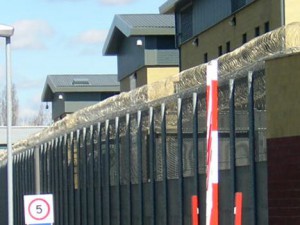Legal services hit again by cuts
Article published: Friday, July 22nd 2011
Last week the Immigration Advisory Service went into administration, leaving thousands without representation. Its fall comes only one year on from the bankruptcy of Refugee and Migrant Justice, itself one of the largest providers of legal advice, adding to widespread fears of mounting damage to publicly funded justice.
 The moment most people learned of the Immigration Advisory Service’s (IAS) collapse was when staff arrived at their workplaces to find their employer had changed the locks. It was not long before details emerged; the UK’s largest charitable provider of immigration and asylum legal aid had gone bust. It took with it representation and advice for thousands of live cases.
The moment most people learned of the Immigration Advisory Service’s (IAS) collapse was when staff arrived at their workplaces to find their employer had changed the locks. It was not long before details emerged; the UK’s largest charitable provider of immigration and asylum legal aid had gone bust. It took with it representation and advice for thousands of live cases.
The Legal Services Commission (LSC) announced that the charity left behind it at least 8,000 open case files, 1,242 of which were unaccompanied asylum seeking children, alongside 385 cases that had appeal hearings pending within two weeks. Desperate clients left without advice and representation were advised to ring a helpline, change their forwarding addresses for legal documents and find themselves any other help they could.
“We’ve had people ringing up distressed, we’re firefighting and we’re trying to help any way we can” said Denise McDowell, director of the Greater Manchester Immigration Aid Unit (GMIAU). IAS had been granted 80 per cent of the city’s contracts in the last round of funding, leaving other providers only able to take on a few cases. “There are only two providers in Manchester”, she explained, with “hundreds if not thousands of cases” left stranded. “Where else are they supposed to go?”
What killed IAS?
In the aftermath fingers were quickly pointed towards government cuts. Case fees are to be cut by 10 per cent from next autumn and the legal aid bill working its way through Parliament aims to remove most non-asylum immigration cases from public funding. In a statement the charity said “there are few organisations that could cope with the compound effect of removal of immigration from the scope of legal aid and a cut in fees for asylum clients”.
The charity had long been in financial difficulties, with its accounts for the 2009/10 financial year indicating that it spent £16.9m while earning only £16.1m. Soon after the collapse an LSC spokesman said the charity had erroneously claimed “several millions” in fees, and that “concerns around financial management and claims irregularities…prompted IAS trustees’ to conclude that the organisation was no longer financially viable”.
Government minister Jonathan Djanogly further claimed that there had been “extensive efforts on the parts of both IAS and the LSC to negotiate a solution to the current financial position”. This raises the question of why no preparations appear to have been made for the collapse of a charity that by its own account provided almost a third of immigration and asylum legal aid in the UK. Mule put this to LSC, and was told “the Immigration Advisory Service’s decision to go into administration was theirs alone.”
Priorities
Since the collapse LSC has written to the UKBA and the Judiciary asking them to take a “sensitive approach” to upcoming cases and arranged “emergency cover” for advice surgeries at Tinsley, Brook House and Lindholme detention centres and Police Station Telephone Advice Scheme slots. A spokesman said overall providers had the capacity to take on 28,145 new cases, that urgent case transfers would be completed in the next few days, and that “our priority now is to work closely with IAS and the administrators to ensure clients of IAS continue to get the help they need, whilst safeguarding public money.”
McDowell told Mule that initial offers from the LSC to Manchester’s two remaining providers amounted to a 50 per cent increase on their contracts. This may not be so generous; IAS’s dominance of the provider market in the last contract round was such that this would only amount to 400 extra cases in Greater Manchester according to her estimates. And figures obtained under the Freedom of Information Act reveal there are in fact thousands of “matter starts” for beginning new cases in the North West that have been left unallocated.
As of 28 June in Greater Manchester alone there were 1,818 asylum case starts, on top of 1,511 non-asylum immigration cases. When asked why these had not been made available, the LSC said “we are very much aware of the issue of reallocating new matter starts, but our immediate priority is to ensure that all former IAS clients and in particular people with urgent cases due now or in the next few weeks continue to get the help they need. We will provide an update in due course.”
Questionable costs
A quarter of the LSC’s annual budget is spent on legal aid and the government body is under major pressure to reduce costs by 23 per cent over the next four years. The upcoming bill includes cuts of £350m to the Ministry of Justice’s £2.1bn budget and the government’s own figures predict 80 per cent of the impact to fall on the poorest fifth of the country. Nevertheless the government intends to press ahead, with Justice Minister Kenneth Clarke telling the Today programme that “our legal aid bill is the most expensive in the world by far”.
While the UK’s legal aid bill is comparatively high, at £39 per head according to the minister’s figures, international comparisons have been criticised as misleading. “The Immigration Law Practitioner’s Association (IPLA) noted the difficulty in comparing “inquisitorial” systems used in Europe, where the court itself is responsible for gathering evidence, with the UK’s “adversarial” system where the person before the court is responsible for building a case, increasing the cost of lawyers.” Adding to this, the Justice Select Committee noted last March the “dearth of evidence on legal aid expenditure to enable the identification of key influences on cost”.
In reality the expense of immigration legal aid has flattened at an average annual spend of £90m since New Labour’s market-based “reforms” including competitive tendering, fixed fees and payment only at the conclusion of cases were implemented in stages from 2007. Yet despite claims these measures were necessary to stop “unsustainable” rises in public expenditure, there was an even larger drop before their introduction from £195m to £113m between 2005 and 2006. At the time the Law Society noted that while costs had been rising the main increases were for “crown court and higher court costs”, with most other areas having “increased only slowly if at all”.
Vulnerabilities
These very measures brought in under the past government have been blamed for leading to a consolidated provider market, dominated by large groups such as IAS, with economic incentives that lead some firms to churn out often poor quality work. The introduction of fixed rather than hourly fees from 2007, regardless of the length or complexity of a case, were criticised at the time as a “breathtaking risk” by the Constitutional Affairs Committee, who warned that providers may “cherry pick” simple cases leading to situations “likely to disadvantage already vulnerable clients”.
Competition appears to have led to small providers being pushed aside in contract rounds in favour of large organisations able to offer cheaper costs, with the director of the Legal Action Group Steve Hynes noting that IAS “won the tender in preference to some good private practice firms and law centres in and around the city”. Yet costs are often unpredictable, particularly with frequent changes to government funds, and as Denise McDowell pointed out “the bigger the organisation the greater the liabilities”.
IAS’s collapse comes just one year after the similar end of the highly respected charity Refugee and Migrant Justice (RMJ), which fell following the introduction of new regulations last year that only pay fees at the conclusion of cases, leading a frustrated McDowell to exclaim that “we’d hoped lessons had been learned”.
Damage Control
RMJ itself was responsible for 10,000 cases and the fall of two of the largest providers of immigration legal aid within a year led Hynes to denounce “the folly of pursuing a strategy of trying to concentrate legal aid work between fewer larger suppliers,” warning there was even a danger that “the government could be in danger of breaching international law which requires that legal advice services are provided to refugees seeking asylum”.
As for picking up the pieces, Hynes warned of the difficulties of repairing the damage due to IAS having “let staff go and the rules regarding tenders”, in what he called a “disastrous” outcome for immigration advice in Manchester. For McDowell’s part, she said her team at GMIAU were “working our hardest to pick up the pieces but it’s an uphill battle. We need the LSC to act quickly and we need people, including MPs, to challenge the legal aid bill going through Parliament.”
Outcry has already forced Ken Clarke to announce a £20m emergency fund for non-profit advice centres, though the legal bill and the “reforms” within are still being shoved through. Critics argue that the measures will not even cut costs to the state, and IPLA has predicted mounting expenses as the number of immigration detainees increases thanks to their inability to “obtain legal advice or representation…even though they may have a strong immigration case and entitlement to stay in the UK”. That may be so. But then again, why else might those in power wish to clamp down on the ability of the vulnerable to access the law?
Richard Goulding
More: Cuts, Migration and asylum, News
Comments
-
[…] for free legal advice. The last two years have seen the collapse of two major advice providers, the Immigration Advisory Service and Refugee and Migrant Justice, following restrictive reforms to government funding, and the […]
Pingback by » Law centre launches bid for legal challenge against council cuts - MULE on May 4, 2012 at 3:47 pm
The comments are closed.





